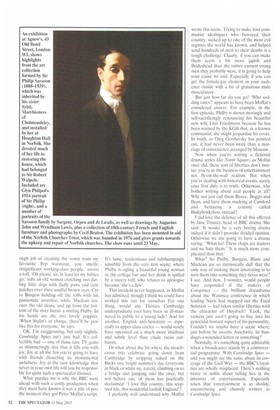Misplaced loyalties
James Delingpole
My favourite moment in Cambridge Spies was the puppy sequence. It's 1933 and, fresh from inventing the NHS, eradicating global poverty and starring in an unusually hilarious Footlights revue, Burgess, Maclean and Philby round the corner to see a gang of snooty Old E,tonians in white tie, manhandling a group of poor washerwomen into the Cam.
'This'll teach you to make a more thor
ough job of cleaning the vomit from my favourite Pop waistcoat, you smelly, insignificant working-class people,' snorts a toff. 'Oh please, sir, at least let my babies go,' sobs an old woman clutching two darling little dogs with fluffy paws and cute patches over their soulful brown eyes. Cut to Burgess holding off the toffs with his passionate invective, while Maclean rescues the old dears, and up from the bottom of the river bursts a smiling Philby. In his hands are the two lovely puppies. 'When Stalin's in charge, there'll be pets like this for everyone,' he says.
OK, I'm exaggerating, but only slightly. Cambridge Spies isn't just bad. It's collectibly bad — one of those rare TV gems so shimmeringly dire that it fills you with joy. Joy at all the fun you're going to have with friends dissecting its monumental awfulness. Joy at the sure knowledge that never in your own life will you be responsible for quite such a spectacular disaster.
What puzzles me is why the BBC went ahead with such a costly production when they must have known it was a pile of poo the moment they got Peter Moffat's script. It's lame, tendentious and tubthumpingly unsubtle from the very first scene, where Philby is ogling a beautiful young woman in the college bar and her drink is spilled by a sneery toff, who refuses to apologise because 'she's a Jew'.
This incident never happened, as Moffat has admitted. though I think we could have worked this out for ourselves For one thing, would any Thirties Cambridge undergraduate ever have been so ill-mannered in public to a young lady? And for another, English anti-Semitism — especially in upper-class circles — would surely have operated on a much more insidious and subtle level than crude racist outbursts.
Or what about the bit where the treacherous trio celebrate going down from Cambridge by stripping naked on the Backs one bright summer's day (everyone in black or white tie, natch), climbing on to a bridge and jumping into the river, but not before one of them has poetically declaimed: 'I love this country, this seeptred isle, this wonderful foolish England'?
I perfectly well understand why Moffat
wrote this scene. Trying to make four communist idealogues who betrayed their country, sucked up to one of the most evil regimes the world has known, and helped send hundreds of men to their deaths is a tough challenge. Clearly, if you can make them seem a bit more japish and Brideshead than the rather earnest young men they probably were, it is going to help your cause no end. Especially if you can get the female/gay element in your audience onside with a bit of gratuitous male musculature.
But just how far do you go? 'Who sodding cares?' appears to have been Moffat's considered answer. For example, in the first episode, Philby is shown movingly and self-sacrificingly renouncing his beautiful new wife Litzi Friedmann because he has been warned by the KGB that, as a known communist, she might jeopardise his cover. In truth, as Oleg Gordievsky has pointed out, it had never been more than a marriage of convenience arranged by Moscow.
Now when you're writing a fictional drama series like North Square, as Moffat once did, these sort of liberties don't matter: you're in the business of entertainment not fly-on-the-wall realism. But when you're dealing with historical events, surely your first duty is to truth. Otherwise, why bother writing about real people at all? Why not just call them Bunce, Boggis and Bean, and have them studying at Camford and betraying a country called Binkybonkyboo, instead?
I did love the defence of all this offered by Jane Tranter, head of BBC drama. She said: 'It would be a very boring drama indeed if it didn't provoke divided opinion. Otherwise we are going to have a drama saying: "What ho! These chaps are traitors and we hate them." It is much more complicated than that.'
What? So Philby, Burgess. Blunt and Maclean are so intrinsically dull that the only way of making them interesting is to turn them into something they never were? I see. And how, I wonder, would people have responded if the makers of Conspiracy — the brilliant docudrama about the Wannsee conference in which leading Nazis had mapped out the Final Solution — had taken similar liberties with the character of Heydrich? 'Look, the viewers just aren't going to buy into his genocidal bastard aspect of his personality. Couldn't we maybe have a scene where, just before he invents Auschwitz, he bandages a wounded kitten or something?'
Normally, it's something quite admirable when a broadcaster stands by a controversial programme. With Cambridge Spies — and you might say the same about its coverage of the Gulf War — the BBC's loyalties are wholly misplaced. There's nothing brave or noble about telling lies in the interests of entertainment. Especially when that entertainment is as shoddy, unconvincing and clumsily written as Cambridge Spies.



































































 Previous page
Previous page